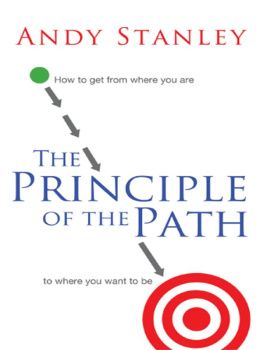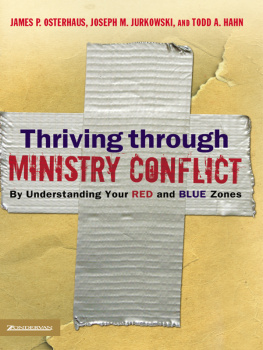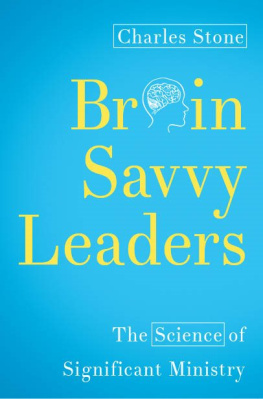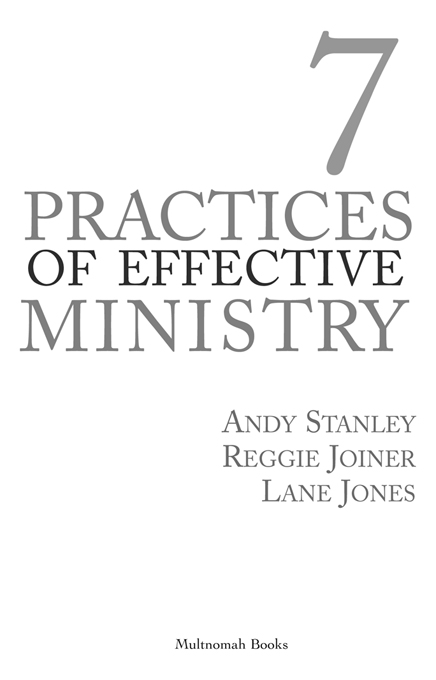10. PRACTICE #1: Clarify the Win
Define what is important at every level of the organization
11. PRACTICE #2: Think Steps, Not Programs
Before you start anything, make sure it takes you where you need to go
12. PRACTICE #3: Narrow the Focus
Do fewer things in order to make a greater impact
13. PRACTICE #4: Teach Less for More
Say only what you need to say to the people who need to hear it
14. PRACTICE #5: Listen to Outsiders
Focus on who youre trying to reach, not who youre trying to keep
15. PRACTICE #6: Replace Yourself
Learn to hand off what you do
16. PRACTICE #7: Work On It
Take time to evaluate your workand to celebrate your wins
To the Leadership Team of North Point Community Church, with whom we have had the pleasure of living out these seven practices. Our prayer is that we always remain on the same page.
Preface
A NEW SEASON
Every Monday morning at 8:00, I sit down with our staff leadership team at North Point Community Church for a time of learning. These are valuable times. And honestly, these are often frustrating times. Frustrating because we are forced to look beyond where we are to where we could and should be as an organization.
These are the discussions that, in terms of programming, lead to new beginnings and untimely deaths.
The debate is unfiltered. At times it gets personal. Weve all lost our cool at one time or another. Im not always right. And there are mornings when it seems like we are wasting everybodys time.
But we continue to meet. We continue to harness our differences for the sake of synergy. Consequently, we continue to learn and grow together.
Over and over it is the seven practices described in this book that have enabled us to punch through the fog of information and emotion. It is our commitment to these seven guidelines that has enabled us to find clarity and make the tough calls. These seven principles provide the context for all of our discussions and decisions.
Dozens of wonderful books have been written for church leaders on how to increase attendance, develop programming, or disciple people. This is not one of those books.
The 7 Practices of Effective Ministry is not so much about what to do as it is about what to ask. This book will not tell you how to implement programs, but it will provide you with a new lens through which to evaluate your current programs and any you may be considering. You will find no new strategy hidden in these pages. But as you embrace each of these seven practices, your ministry cannot help but become more strategic in everything it does.
PRACTICES, NOT PROGRAMS
The seven practices are just thatpractices. These are not new program ideas. You dont have to be in church work long to discover that there are no one-size-fits-all programs. Ministry is more art than science, and our ever-changing culture makes it necessary to constantly evaluate, launch, and occasionally even kill programming.
The seven practices are designed to provide a template that will help you determine which programs to start, what to stop, and how to improve whats working. When implemented properly, these practices will energize every facet of your ministry.
So what are these seven practices?
1. Clarify the Win. It is impossible to know if you are making progress if you are not clear about your destination. This means examining each and every event and program and asking the question, When all is said and done, what is it we want to look back on and celebrate?
2. Think Steps, Not Programs. Your programs should take people somewhere, not simply fill up their time. Ask yourself, Where do we want our people to be? What do we want them to become? Is our programming designed to take them there?
3. Narrow the Focus. Focus is the key to achieving excellence and making an impact. Each ministry environment should be designed to do no more than one or two things well.
4. Teach Less for More. The less you say, the more you will communicate. You will be more effective at every level of your organization if you say only what you need to say to the people who need to hear it.
5. Listen to Outsiders. The needs and interests of insiders have a tendency to determine the agenda for the organization. This is especially true of the church. Focus your efforts on those youre trying to reach, rather than on those youre trying to keep.
6. Replace Yourself. One day someone else will be doing what you are doing. Whether you have an exit strategy or not, ultimately, you will exit. So embrace the inevitable and prepare now for the future.
7. Work On It. To maintain your relevance, your sanity, and your effectiveness, you must carve out time in your schedule to step back and evaluate what you are doing and how you are doing it.
Notice something missing? Conspicuously absent here is any discussion about prayer, the Holy Spirit, and dependence upon God. Though absent from the book, these things are certainly not absent from the culture of North Point or from any healthy church.
In fact, the seven practices have proven an answer to our fervent prayers as we sought to create a church that reflects the mission of our Savior. We are convinced that these practices are practical expressions of how the Holy Spirit has chosen to work through the local church. And we have come to depend more on God and less on ourselves as these practices have forced us to let go of some comfortable yet ineffective approaches to ministry.
PLAY BALL!
As you are about to discover, this book is divided into two sections. It begins with a story written by Lane Jones, one of North Points original six staff members. The narrative focuses on a pastor who plays hooky from an elders meeting to attend a major league baseball game. That evening, within the context of that single game of baseball, the pastor discovers seven principles that form the basis of the seven practices.
In the second half of the book, another of our original staff members, Reggie Joiner, will delve more deeply into each of the seven practices. He will also share a few pages from North Points playbook to let you see how these practices have been put into action in a ministry setting. Speaking on behalf of our entire team, we can tell you from experience that these principles work.
If you are reading this book alone, I suggest you read it straight through. If you are working through these pages as a team, my recommendation is that you first read a chapter of the parable, then read and discuss the corresponding chapter in the second section. This will give your team an opportunity to evaluate your current ministry environments within the context of each of the seven practices.
Consider this book your ministrys own spring training. As you begin this new season in your ministry and begin to establish each of these seven practices on your team, you will soon find that together you are able to create extraordinary ministry environmentsenvironments that will make your church irresistible to believers and unbelievers alike.




















